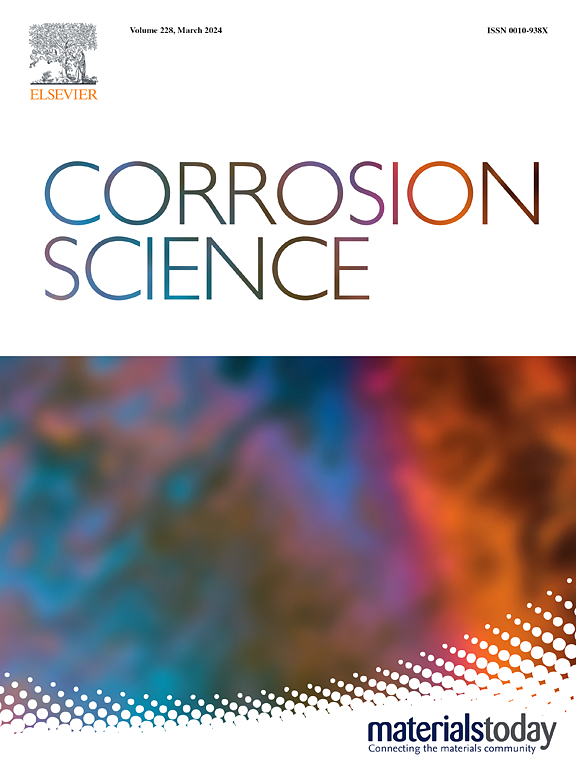Assessment of carbon steel and corrosion resistant alloy corrosion in geothermal environments containing sulphuric acid
IF 7.4
1区 材料科学
Q1 MATERIALS SCIENCE, MULTIDISCIPLINARY
引用次数: 0
Abstract
This work focusses on understanding corrosion severity and pipeline material performance within model geothermal sulphuric acid (H2SO4)-containing environments. A tantalum-lined high pressure/high temperature autoclave is used to assess the corrosion behaviour of N80 carbon steel compared to 13 Cr and 22 Cr duplex stainless steel when exposed to H2SO4 solutions between a pH of 2–4, and at a temperature of 150 °C. Significant increases in solution pH were observed during 20-hour exposure experiments, resulting from acid consumption due to ongoing corrosion reactions. The resulting pH shift led to a notable reduction in corrosion rates over time, creating uncertainty when assessing long-term material degradation under variable environmental conditions. To address this uncertainty, corrosion rates were analysed in the early stages of exposures, enabling a reliable correlation between temperature, pH and metal composition. Linear polarisation resistance (LPR) measurements revealed that corrosion of carbon steel was primarily influenced by solution acidity, with temperature playing a secondary role. A comparative analysis of corrosion performance revealed that uniform and pitting corrosion rates decreased in the following order: carbon steel > 13 Cr stainless steel > 22 Cr duplex stainless steel. These results offer valuable insights into material selection and corrosion mechanisms relevant to geothermal energy applications.
碳钢和耐腐蚀合金在含硫酸地热环境中的腐蚀评价
这项工作的重点是了解模型地热硫酸(H2SO4)含环境中的腐蚀严重程度和管道材料性能。当暴露在pH值为2-4的H2SO4溶液中,温度为150°C时,使用钽衬里的高压/高温高压灭菌器来评估N80碳钢与13cr和22cr双相不锈钢相比的腐蚀行为。在20小时的暴露实验中观察到溶液pH值的显著增加,这是由于持续的腐蚀反应引起的酸消耗。随着时间的推移,由此产生的pH值变化导致腐蚀速率显著降低,这在评估材料在可变环境条件下的长期降解时产生了不确定性。为了解决这一不确定性,在暴露的早期阶段就分析了腐蚀速率,从而建立了温度、pH值和金属成分之间的可靠相关性。线性极化电阻(LPR)测量表明,碳钢的腐蚀主要受溶液酸度的影响,温度起次要作用。腐蚀性能对比分析表明,均匀腐蚀速率和点蚀速率依次递减的顺序为:碳钢>; 13cr不锈钢>; 22cr双相不锈钢。这些结果为与地热能应用相关的材料选择和腐蚀机制提供了有价值的见解。
本文章由计算机程序翻译,如有差异,请以英文原文为准。
求助全文
约1分钟内获得全文
求助全文
来源期刊

Corrosion Science
工程技术-材料科学:综合
CiteScore
13.60
自引率
18.10%
发文量
763
审稿时长
46 days
期刊介绍:
Corrosion occurrence and its practical control encompass a vast array of scientific knowledge. Corrosion Science endeavors to serve as the conduit for the exchange of ideas, developments, and research across all facets of this field, encompassing both metallic and non-metallic corrosion. The scope of this international journal is broad and inclusive. Published papers span from highly theoretical inquiries to essentially practical applications, covering diverse areas such as high-temperature oxidation, passivity, anodic oxidation, biochemical corrosion, stress corrosion cracking, and corrosion control mechanisms and methodologies.
This journal publishes original papers and critical reviews across the spectrum of pure and applied corrosion, material degradation, and surface science and engineering. It serves as a crucial link connecting metallurgists, materials scientists, and researchers investigating corrosion and degradation phenomena. Join us in advancing knowledge and understanding in the vital field of corrosion science.
 求助内容:
求助内容: 应助结果提醒方式:
应助结果提醒方式:


